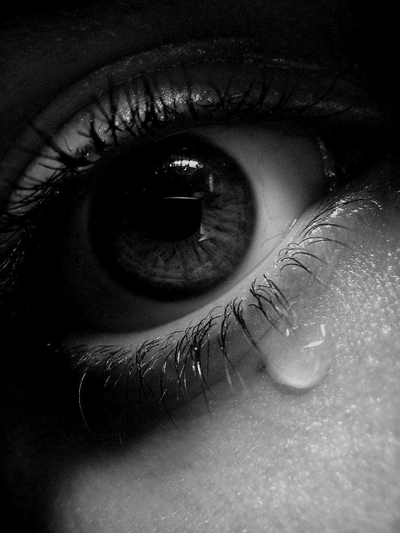Events
Upcoming Events
Past Events
INTERNATIONAL OVERDOSE AWARENESS DAY, 2015
|
The Overdose Aware App is now available.
The Overdose Aware app has been launched by Penington Institute, Australia and was funded with the kind support of The William Buckland Foundation. Get informed. Get the app. The Overdose Aware app aims to raise awareness among those who are experiencing drug use and their families, of how to recognise overdose signs and respond accordingly. The app includes:
Get the App from the official website here. |
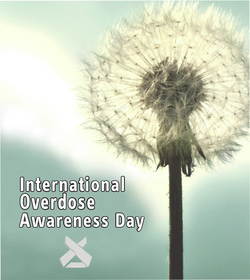
August 31 is International Overdose Awareness Day.
PsyGlobal will join hundreds of organizations around the world in their efforts towards de-stigmatizing drug related overdose and minimizing preventable fatalities. |
TRUTHS ABOUT SUICIDE
1. Annually one million people commit suicide. That's tantamount to one death every 40 seconds.
2. The "number of lives lost each year through suicide exceeds the number of deaths due to homicide and war combined".
3. Suicide is in the top three leading causes of death for folks ages 15 - 44.
4. Some studies have attempted suicide numbers 10 to 20 times more than successful suicides.
5. In Europe and North America mental disorders (depression and alcohol use) are major factors.
6. In Asian countries impulsiveness plays a role.
7. Studies have shown that social isolation can increase the risk of suicide and, conversely, that having strong human bonds can be protective against it.
8. One suggestion for awareness on Suicide Prevention Day is to light a candle at 8pm near a window for the survivors of suicide and the for memory of loved lost ones.
9. This year marks the release of the World Suicide Report (WSR) by the World Health Organization (WHO). The goal is to reduce suicides by 10% by 2020.
10. Robin Williams is but one of the statistics of this preventable disease.
UNDERSTAND & ACT....You could save a life.
Learn more about suicide and its prevention at:
http://www.helpguide.org/mental/suicide_prevention.htm
http://www.iasp.info/
Suicide Helplines
Goa: 2252525
Other Cities: http://www.suicide.org/hotlines/international/india-suicide-hotlines.html
Pan India: 022-27546669
1. Annually one million people commit suicide. That's tantamount to one death every 40 seconds.
2. The "number of lives lost each year through suicide exceeds the number of deaths due to homicide and war combined".
3. Suicide is in the top three leading causes of death for folks ages 15 - 44.
4. Some studies have attempted suicide numbers 10 to 20 times more than successful suicides.
5. In Europe and North America mental disorders (depression and alcohol use) are major factors.
6. In Asian countries impulsiveness plays a role.
7. Studies have shown that social isolation can increase the risk of suicide and, conversely, that having strong human bonds can be protective against it.
8. One suggestion for awareness on Suicide Prevention Day is to light a candle at 8pm near a window for the survivors of suicide and the for memory of loved lost ones.
9. This year marks the release of the World Suicide Report (WSR) by the World Health Organization (WHO). The goal is to reduce suicides by 10% by 2020.
10. Robin Williams is but one of the statistics of this preventable disease.
UNDERSTAND & ACT....You could save a life.
Learn more about suicide and its prevention at:
http://www.helpguide.org/mental/suicide_prevention.htm
http://www.iasp.info/
Suicide Helplines
Goa: 2252525
Other Cities: http://www.suicide.org/hotlines/international/india-suicide-hotlines.html
Pan India: 022-27546669
Let's talk Overdose again.
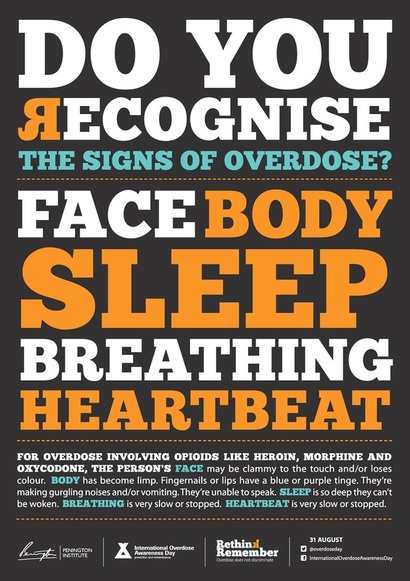
International Overdose Awareness Day hopes to diminish the shame and guilt associated with drug use. That includes all drugs, licit and illicit (and alcohol, too).
Globally between 102,000 and 247,000 people died from drug overdoses in 2011 (UNODC, 2013). Drug-related deaths in Asia are extremely tentative because of poor regional coverage and reporting of mortality data, according to the UNODC. However the agency estimated between 15,000 and 140,000 deaths a year in Asia.
Overdose Basics
What is an overdose?
An overdose means having too much of a drug (or combination of drugs) for your body to be able to cope with. There are a number of signs and symptoms that show someone has overdosed, and these differ with the type of drug used.
Alcohol poisoning/overdose
Generally people do not automatically think of alcohol when they think of overdose, but alcohol is a depressant and it is all too possible to overdose on it. Acute alcohol poisoning, which is usually a result of binge drinking, is an example.
Our bodies can process about one unit of alcohol an hour. If you drink a lot quickly the amount of alcohol in your bloodstream (blood alcohol concentration, or BAC) may become dangerously high, which can stop your body from working properly. In extreme cases, alcohol poisoning could stop you breathing, stop your heart or cause you to choke on your own vomit.
Signs of alcohol intoxication to the point of overdose include:
Stimulant overdose
It is possible to overdose on amphetamines such as speed and ice. Amphetamine overdose increases the risk of heart attack, stroke, seizure or drug-induced psychotic episodes.
Amphetamine overdoses look different from an opioid OD, and signs and symptoms include:
Globally between 102,000 and 247,000 people died from drug overdoses in 2011 (UNODC, 2013). Drug-related deaths in Asia are extremely tentative because of poor regional coverage and reporting of mortality data, according to the UNODC. However the agency estimated between 15,000 and 140,000 deaths a year in Asia.
Overdose Basics
What is an overdose?
An overdose means having too much of a drug (or combination of drugs) for your body to be able to cope with. There are a number of signs and symptoms that show someone has overdosed, and these differ with the type of drug used.
Alcohol poisoning/overdose
Generally people do not automatically think of alcohol when they think of overdose, but alcohol is a depressant and it is all too possible to overdose on it. Acute alcohol poisoning, which is usually a result of binge drinking, is an example.
Our bodies can process about one unit of alcohol an hour. If you drink a lot quickly the amount of alcohol in your bloodstream (blood alcohol concentration, or BAC) may become dangerously high, which can stop your body from working properly. In extreme cases, alcohol poisoning could stop you breathing, stop your heart or cause you to choke on your own vomit.
Signs of alcohol intoxication to the point of overdose include:
- disorientation
- loss of coordination
- vomiting
- seizures
- slow breathing (less than eight breaths a minute)
- blue-tinged/pale skin
- low body temperature
- being conscious but unresponsive
- unconsciousness (passing out).
Stimulant overdose
It is possible to overdose on amphetamines such as speed and ice. Amphetamine overdose increases the risk of heart attack, stroke, seizure or drug-induced psychotic episodes.
Amphetamine overdoses look different from an opioid OD, and signs and symptoms include:
- chest pain
- disorientation/confusion
- severe headache
- seizures
- high temperature (overheating, but not sweating)
- difficulty breathing
- agitation and paranoia
- hallucinations
- unconsciousness.
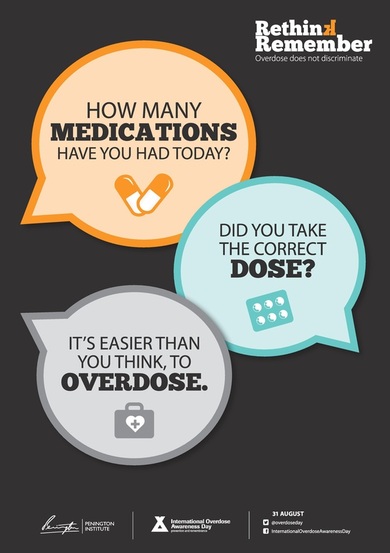
- shallow breathing/ no breathing
- snoring or gurgling sounds
- blue lips or fingertips
- floppy arms and legs
- no response to stimulus
- disorientation
- unrousable (can’t be woken up) unconsciousness.
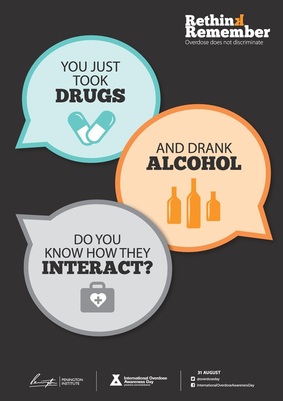
Mixing drugs
Taking more than one kind of drug at a time puts strain on the body and can increase both effect and the risk. For example, most heroin-related overdoses are caused when other depressant drugs are taken too. Alcohol and benzos like alprazolam (marketed as Xanax) and temazepam (Temaze) are depressants, and mixing them with drugs like heroin, oxycodone (Oxycontin) or morphine (MS Contin) greatly increases the risk of an overdose.
What to do if someone is overdosing
- stay with them and assure them everything will be okay
- if they appear unconscious, try to get a response from them (eg: call their name).
- If you can’t get a response put them in the recovery position and call an ambulance.
- Commence first-aid. Emergency operators can give CPR instructions.
- Keep an eye on them. People can go in and out of consciousness.
- If stimulants such as amphetamines are thought to be involved, a person may feel hot, anxious or agitated. Try to move them somewhere cooler and quieter. Or try to make the place quieter.
When to call an ambulance
People are often reluctant to call an ambulance for fear of police involvement or concern about the cost of a call-out. The police will only attend if there is a fatality or if their presence is requested, for example if the ambulance crew feel threatened. This is an issue worldwide.
In addition to unconsciousness, call for emergency help when someone is:
It is not necessary for someone to have all of these signs or symptoms for them to be overdosing. Exhibiting only a few could still mean they are in trouble and need emergency help.
People are often reluctant to call an ambulance for fear of police involvement or concern about the cost of a call-out. The police will only attend if there is a fatality or if their presence is requested, for example if the ambulance crew feel threatened. This is an issue worldwide.
In addition to unconsciousness, call for emergency help when someone is:
- having a seizure
- experiencing severe headache
- experiencing chest pain
- experiencing breathing difficulties
- extremely paranoid, agitated and/or confused.
It is not necessary for someone to have all of these signs or symptoms for them to be overdosing. Exhibiting only a few could still mean they are in trouble and need emergency help.
Useful links:
- www.overdoseday.com
- United Nations Office on Drugs and Crime www.unodc.org
- Harm Reduction International, formerly known as the International Harm Reduction Alliance www.ihra.net
- Asian Harm Reduction Network (AHRN) www.ahrn.net
- Indian Harm Reduction Network http://ihrn.in/

Psy.Q
Overdose is extremely dangerous and rarely addressed. It does not discriminate among its victims. Some extremely talented people have died of accidental overdose. They include Jim Morrison, Jimi Hendrix, Elvis Presley, Michael Jackson, Bruce Lee, Heath Ledger, Amy Winehouse and most recently, Cory Monteith.
Overdose is extremely dangerous and rarely addressed. It does not discriminate among its victims. Some extremely talented people have died of accidental overdose. They include Jim Morrison, Jimi Hendrix, Elvis Presley, Michael Jackson, Bruce Lee, Heath Ledger, Amy Winehouse and most recently, Cory Monteith.
- Overcoming Social Anxiety Group Therapy Programme starting from 8th April, 2014. Regsitrations Now Closed
- 'Quit Smoking' Group Therapy Meetings starting from 12th April, 2014. Regsitrations Now Closed.
- Training Workshop on the Exner Comprehensive System of Rorshach in April, 2014. Location: Panjim, Goa.
- Training Workshop on the Thematic Apperception Test (Indian Adaptation by Uma Chaudhary) in April, 2014: Location: Panjim, Goa
September 10, 2013: World Suicide Prevention Day.
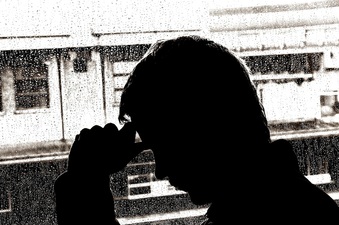
Nearly one million people worldwide die by suicide each year. This corresponds to one death by suicide every 40 seconds.
The number of lives lost each year through suicide exceeds the number of deaths due to homicide and war combined.
These staggering figures do not include nonfatal suicide attempts which occur much more frequently than deaths by suicide.
Discrimination can prevent or discourage people affected by mental illnesses and/or suicidal ideation or behavior from seeking professional help or from returning to their normal social roles after receiving treatment for an episode of illness or crisis.Unless
stigma is confronted and challenged, it will continue to be a major barrier to
the treatment of mental illnesses and to the prevention of suicide.
World Suicide Prevention Day is an ideal time to inspire people to work towards the goal of developing creative new methods for eradicating stigma.
World Suicide Prevention Day is an ideal time to inspire people to work towards the goal of developing creative new methods for eradicating stigma.
Feeling overwhelmed?
Helping you stay safe.
Helping you stay safe.
|
A life worth living
It’s easy to feel overwhelmed when bad things happen. There may not be a simple answer or the pain may seem just too much to bear. You may even have thoughts that your life is just not worth living. This might be the time to get some help. Suicidal thoughts are quite common but we tend not to talk about them. It can be embarrassing or frightening to tell someone else about such private thoughts. And most people with suicidal thoughts manage to keep themselves safe. Being honest with yourself is the first step in keeping yourself safe. If you are reading this leaflet, it could be helpful for you to share your worries and distress with someone else. It is never too late to take action, even if the situation seems hopeless. Finding help Finding someone you can trust is the first step. You may have someone in mind already. Talking and being listened to can help you to get things clearer in your mind and feel more hopeful. Sometimes it can be easier to talk things over with someone who does not know you. It might be hard to believe that someone you haven't met before cares about you and your situation, but there are people who do care and want to listen. If you are having thoughts of harming yourself in any way, we would encourage you to:
Helpful suggestions to think about
Support organisations for people who are distressed, are experiencing suicidal thoughts or who self-harm and their families Anything you tell them will be completely confidential. The volunteers are ordinary people who won't judge you. Some of the most popular organisations are listed below. You may contact as many or as few as you like - it's up to you and it's OK to contact more than one. http://www.suicide.org/hotlines/international/india-suicide-hotlines.html |
We all want to make sure that you know what help you can get to stay safe and how you can get it.
We know that you may feel completely helpless - we’re just glad that you have taken the time to read this. In spite of feeling that you have no control over your life, there may be some things that you – and other people - can do to make things better. There will be people who really do want to help. You may know them already, like your family and friends, or they may be professionals who you have not met yet. When things go wrong Bad things happen to all of us – but it can be hard to talk about them. Other people may find it difficult to help. They find it hard to know what to say to someone you know who is going through it. When things go wrong, each of us reacts in a different way. You could feel numbed, agitated or shocked. You may find yourself overwhelmed by your feelings - or cut off from them. It can feel really lonely when you are distressed. We hope that the information in this leaflet can help you to feel less alone, in spite of in your troubles. Can anyone understand me? It can be hard to share private thoughts and feelings. But if you do, it can help, and can be a real way of getting through a bad time. However you feel, and however personal it seems, other people will have gone through similar things and so really can understand something of what you are going through. Helping yourself You can help yourself in many ways. You can start by making a ‘safety plan’ for yourself. This is a plan to help you keep safe - it will work best if you put it together yourself and choose the kind of support that you think will be helpful. Only you can find your own reasons for living. If you find it hard to see any future at all, it may be time for you to think about allowing someone to help you get through this difficult time. Making a ‘Safety Plan’ A safety plan can help organise your thoughts, so you get the right support at the times you need it. Make a simple list of the things you can do for yourself and the people who you would like to support you. It’s easier if we know who we can talk to before we need them. You may want to ask someone else to help you put it together. You may find it helpful to include reminders of the good things in your life and things to look forward to in the future A safety plan could include:
My Safety Plan 1. 2. 3. 4. |
Main Authors: Dr Alys Cole-King, Consultant Liaison Psychiatrist/Open Minds Alliance CIC with comments from Professor Stephen Platt, Dr Gil Green (STORM), Dr Chris Manning and Martin Seager College of Medicine Mental Health Advisory Board and Dr Philip Timms, with contributions from RCGP/RCPsych Mental Health Forum. ©The Royal College of Psychiatrists
MYTHS ABOUT SUICIDE
|
Myth: Most suicides happen in the winter months. Fact: Suicide is more common in the spring and summer months. Myth: People who threaten suicide are just attention seeking and shouldn’t be taken seriously. Fact: People who threaten suicide should always be taken seriously. It may well be that they want attention in the sense of calling out for help, and giving them this attention may save their life. Myth: People who are suicidal want to die. Fact: The majority of people who feel suicidal do not actually want to die; they do not want to live the life they have. The distinction may seem small but is in fact very important and is why talking through other options at the right time is so vital. |
Myth: You have to be mentally ill to even think about suicide.
Fact: Most people have thought of suicide from time to time and not all people who die by suicide have mental health problems at the time of death. However, many people who kill themselves do suffer with their mental health, typically to a serious degree. Sometimes it’s known about before the person’s death and sometimes not. Myth: People who talk about suicide aren’t serious and won’t go through with it. Fact: People who kill themselves have often told someone that they do not feel life is worth living or that they have no future. Some may have actually said they want to die. While it’s possible that someone might talk about suicide as a way of getting the attention they need, it’s vitally important to take anybody who talks about feeling suicidal seriously. Myth: Once a person has made a serious suicide attempt, that person is unlikely to make another. Fact: People who have tried to end their lives before are significantly more likely to eventually die by suicide than the rest of the population. Myth: If a person is serious about killing themselves then there is nothing you can do. Fact: Often, feeling actively suicidal is temporary, even if someone have been feeling low, anxious or struggling to cope for a long period of time. This is why getting the right kind of support at the right time is so important. |
Myth: Talking about suicide is a bad idea as it may give someone the idea to try it.
Fact: Suicide can be a taboo topic in society. Often, people feeling suicidal don’t want to worry or burden anyone with how they feel and so they don’t discuss it. By asking directly about suicide you give them permission to tell you how they feel. People who have felt suicidal will often say what a huge relief it is to be able to talk about what their experiencing. Once someone starts talking they’ve got a better chance of discovering other options to suicide.
Source: www.samaritans.org
HOW TO ASK R U OK?
You don’t have to be an expert to support someone going through a tough time. You just need to be able to listen to their concerns without judgment and take the time to follow up with them.
Fact: Suicide can be a taboo topic in society. Often, people feeling suicidal don’t want to worry or burden anyone with how they feel and so they don’t discuss it. By asking directly about suicide you give them permission to tell you how they feel. People who have felt suicidal will often say what a huge relief it is to be able to talk about what their experiencing. Once someone starts talking they’ve got a better chance of discovering other options to suicide.
Source: www.samaritans.org
HOW TO ASK R U OK?
You don’t have to be an expert to support someone going through a tough time. You just need to be able to listen to their concerns without judgment and take the time to follow up with them.
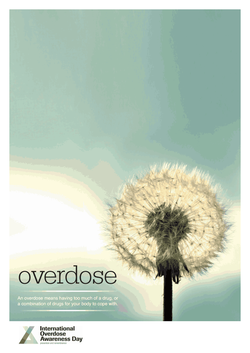
PsyGlobal joined the world in marking August 31, 2013 as International Overdose Awareness Day.







